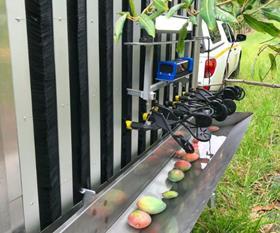
CQUniversity Australia has captured the attention of the mango industry with a successful field trial of the first prototype of its auto-harvester. The technology achieved 75 per cent efficiency in automatically identifying and picking fruit when it was tested in Yeppoon, Queensland.
The prototype was mounted on a trailer, towed by a vehicle and took approximately five seconds to harvest a piece of fruit, from detection to placement. CQUniversity researchers are now working to take their mango sensor and auto-harvest technologies to commercial-ready deployment.
CQUniversity professor Kerry Walsh shared the results at the Australian Mango Industry Association conference in Darwin this week. He told attendees the next goal was to improve the performance of the harvester to over 90 per cent efficiency of fruit in view, to increase speed and to refine construction in order to reduce cost.
If successful, the auto-harvester could solve a number of labour issues currently in the system by allowing farmers to optimise their processes.
“The harvester is part of an integrated system which will ensure farmers know exactly how many fruit are on their trees, when they will be in perfect condition for the consumer, and when to employ the right number of people for picking and packing,” said Walsh.
Ian Groves, of Yeppoon-based Groves Grown Fruit, Yeppoon, hosted the first field trials of the prototype auto-harvester and was excited by the potential of the technology.
“The machinery identifying and counting fruit in the orchard turned out to be within just a few per cent of the actual number of fruit in the entire block last year,” Groves said. “This could be a real game changer, not only for our farm but for the entire industry.”
The next phase of research will investigate options for the machine to be mounted on a terrestrial drone to operate autonomously, at faster speeds and higher accuracies.



